A Pink Floyd Evening
Last Friday, I watched my father give a presentation of the works of my absolute all-time favourite band Pink Floyd in a café in my old home town. While I moved away from the countryside after graduating high school in order to pursue a university degree, I have always paid regular visits back to the town, where I lived out my teenage years and where my parents still lives, and when my father invited me to come and see him and his friend give a presentation on Pink Floyd, a band that is such a large part of our common musical consciousness that I knew I could not refuse.
The event took place in a small café on the shopping street and spanned an entire evening from 6:30 PM to around midnight, and consisted of the music of the different eras of Pink Floyd interspersed with commentary and anecdotes provided by the presenters, my father and his friend.
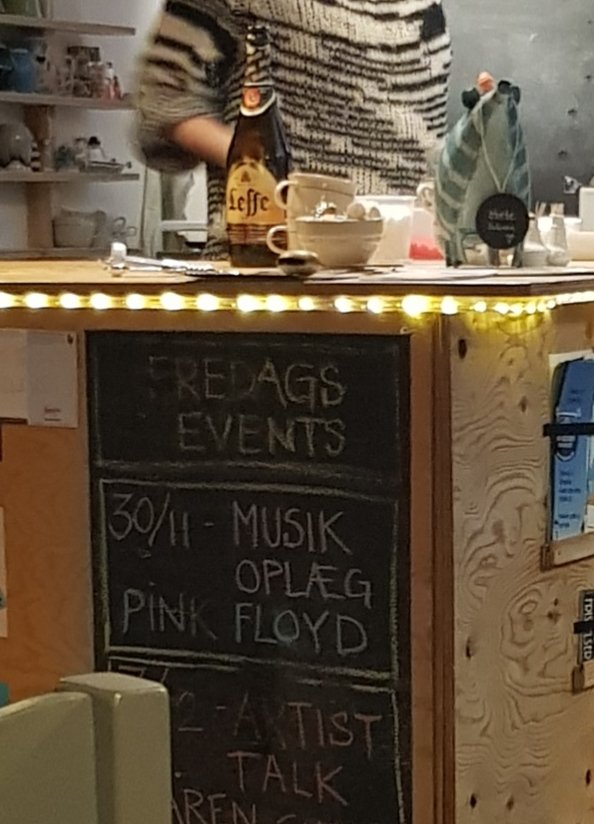
They started from the beginning (because it is a very good place to start) with the Syd Barrett era of Pink Floyd from where they played the two first singles See Emily Play and Arnold Layne, both of which are not actually on the first Pink Floyd album Piper at the Gates of Dawn, but are interesting and representative musical pieces of late sixties London psychedelic rock in general and the Syd Barrett-led era of Pink Floyd in particular.
Both sound and lyrics have a whimsical, garish and playful with the psychedelic bent that the early Pink Floyd would become known for. During the Barrett era, even the harder, edgier tunes such as the lengthy jam session Interstellar Overdrive felt like very light-hearted and whimsical, like an intense, yet happy dream. To me, this era culminated in Bike, the last song on Piper at the Gates of Dawn, that features Barrett’s song writing at its peak with whimsical lyrics loaded with imagery and the psychedelic, poppy sound of the early Pink Floyd.
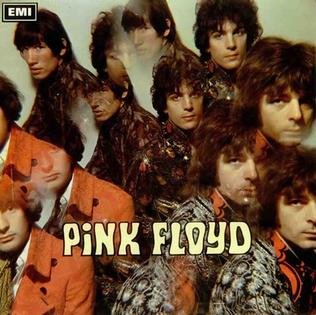
Piper At The Gates of Dawn album art - picture from Wikipedia
Somewhat the same but at the same time entirely different is the next album Saucerful of Secrets, which marks the tragic departure of Syd Barrett, whose growing mental health issues meant that his band mates unceremoniously replaced him with their common friend David Gilmour, whose distinct playing style and guitar sound later became a defining fixture of Pink Floyd. My father and his friend did not play anything from this album during the presentation, but mentioned that the album were released together with Piper at the Gates of Dawn on the compilation album A Nice Pair.
I find this album interesting, as it marks the departure of Barrett and the beginning of Pink Floyd’s search for a new sound after their principal writer was out of the picture. The album has only one track written by Barrett and the rest written by the rest of the band. While some songs such as the opening track Let There Be More Light and Remember a Day are reminiscent of the whimsy of the earlier era, the sound on Saucerful of Secrets is much darker, with the title track being a sinister, brooding soundtrack for a battle with each section representing the different parts of the battle: Something Else representing the preparations for the battle, Syncopated Pandemonium representing the chaotic combat of the battle itself, Storm Signal representing the empty battlefield, and Celestial Voices representing the mourning of the dead. Likewise, Corporal Clegg can seem like a whimsical tune on the surface, but can also be viewed as Roger Waters’ first attempt at dabbling in the topics of politics and war, which culminated in The Wall and The Final Cut, where the former being arguably one of the most famous works of the Pink Floyd. The album ends with the only Barrett composition on the album, called Jugband Blues. Considering Barrett’s mental state and how his musical career ended, I find the last lines of Jugband Blues absolutely haunting:
And the sea isn’t green,
And I love the queen,
And what exactly is a dream?
And what exactly is a joke?
My father and his friend only briefly mentioned the next two Pink Floyd albums: The studio/live album Ummagumma and More, a soundtrack for the movie of the same name. More is one of the few Pink Floyd albums I have trouble with listening to all the way through. There are brilliant and innovative songs, such as the dream-like Cirrus Minor, the romantic Green is The Colour and the grunge-like The Nile Song, but on the whole, the album just feels confusing and jagged.
Ummagumma, which according to my father was apparently Cambridge slang for sex, is a double album, which contained a studio album with compositions from all members of the band, even drummer Nick Mason. This album is what I would consider the apex of the exploratory era of Pink Floyd: Long, dark compositions like Sysyphus, who starts out with droning drums and organs, then lulls you into a false sense of tranquillity only to blast you with a crushing crescendo, very much reminiscent of the myth of Sysyphus itself to full-blown avant-garde pieces such as Several Species of Small Furry Animals Gathered Together in a Cave and Grooving With a Pict, which is what I would call a challenging listen.
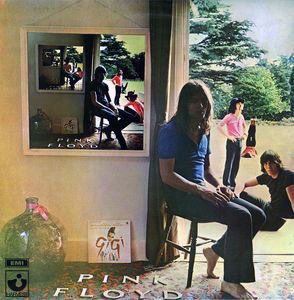
Ummagumma album art - picture from Wikipedia
The live album contains what I would call the definitive version of the songs Careful with that Axe, Eugene, Set the Controls for the Heart of the Sun and Saucerful of Secrets. The Ummagumma version of Set the Controls for the Heart of the Sun is the quintessential space rock anthem, and Careful with that Axe, Eugene with Roger Waters’ primal scream marks one of the darkest, most brutal psychedelic rock tunes. The Ummagumma version of Saucerful of Secrets is the first version I heard, and the one I consider superior to the studio version and even to the Live at Pompeii version and it is also one of my favourite pieces of music.
The next album in the Pink Floyd discography and the next album that my father and his friend played music from is the album Atom Heart Mother, which is also the first Pink Floyd album to ever top the charts in Britain. This album marks the beginning of the end of the exploratory era of Pink Floyd, with the massive orchestral space rock monolith Atom Heart Mother Suite taking up all of side one, and side two being populated by more conventional songs such as If and Fat Old Sun, which was the song my father and his friend chose to play from the album. A song I put on my tiny mp3 player the summer after finishing high school and which conjures up memories of sunny days and the feeling of endless relief and optimism about the future. Besides the track Atom Heart Mother, Alan’s Psychedelic Breakfast stands out as a throwback to the Syd Barrett era as a sort of whimsical, up-beat instrumental (and incidentally the song I play when making weekend brunch)
Next in line for both presentation and music is the album Meddle, which I think is the first album that can be considered a modern Pink Floyd album, with song writing and melodies that feels much more structured and coherent compared to its predecessor Atom Heart Mother. The structure of the albums are similar, albeit reversed: Atom Heart Mother has one track taking up all of side one and several shorter tracks taking up side two, where Meddle has several shorter tracks on side one and the giant 24-minute masterpiece Echoes taking up all of side two. On side one, the opener One of These Days was probably one of the heaviest things you could listen to back in 1971 (besides maybe Black Sabbath’s Paranoid) and is what you could classify early proto-metal. Additionally, A Pillow of Winds are one of the few Pink Floyd songs that can be reliably considered love songs. Echoes is a landmark in Pink Floyd evolution in many ways: The sonar-like ping sound used throughout the track was created by sending a grand piano sound through a Leslie speaker and an echo machine, which was an innovative effect for its time and Roger Waters has called Echoes his first attempt at compassion, referring to the lines in the second verse:
Strangers passing in the street
By chance two separate glances meet
And I am you and what I see is me
I see Echoes as the crowning jewel that marks the end of the exploratory period of Pink Floyd. It combines the layers and the space rock meandering of the earlier post-Barrett albums with a more structured songwriting and lyrics that are getting increasingly less obtuse and more relatable. Echoes was played in the end of the presentation in its full length, as it is the song that my father’s friend wishes to be played during his funeral.
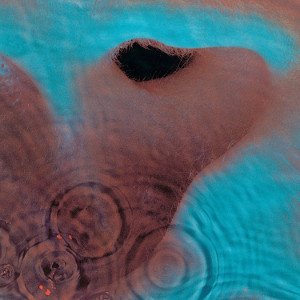
Meddle album art - picture from Wikipedia
In 1972, Pink Floyd released the album Obscured by Clouds, which is in many ways the odd one out in the Pink Floyd discography. The album is a soundtrack for a French movie called La Valleé about a woman's journey of self-discovery in the New Guinea jungle – a movie which my father’s friend characterized as being ”quite narrow”. While I am fairly certain that the soundtrack is more known than the movie at this point simply by the virtue of being a Pink Floyd album, I actually quite like Obscured by Clouds as it is one of the most straightforward Pink Floyd albums without all the progressive and psychedelic rock frills that their previous albums, and most of the later ones too, became known for and this makes it one of the easiest Pink Floyd albums to just put on without having to mentally get in the mood for it. From the album, my father and his friends played Burning Bridges, the last song to feature songwriter credits for Richard Wright and Roger Waters together – a sign of the trouble to come.
The next album bears almost no introduction as it is the Pink Floyd album that is the most universally known and the one that launched Pink Floyd into superstardom. I am of course talking about The Dark Side of the Moon released in 1973. This album is today considered one of the most inescapable albums from the golden age of classic rock. Inspired by the contemporary conflicts of the time as well as former band member Syd Barrett’s deteriorating mental state, Roger Waters set out to write an album around the themes of conflict, greed, the passage of time, death, and insanity and in the process established himself as the principal songwriter in the band. On the album, Pink Floyd continues to push technological boundaries with the use of early synthesizers on the track On The Run and the lyrics explores the pressures of modern life, greed, consumerism and the ever-present threat of war and madness. The Dark Side of the Moon contains some truly magnificent pieces of music: Money (which my father and his friend played) is an all around great rock track complete with a sax solo and tempo change, Time arguably has one of the greatest Gilmour guitar solo in the whole Pink Floyd discography and the soul-crushingly beautiful The Great Gig in The Sky with improvised wordless lyrics by singer Clare Torry sung over an old piano composition by Richard Wright. While Dark Side of the Moon contains absolutely amazing material I cannot say it is my favourite Floyd album. Especially side two gets a little bit meandering to me around Any Colour You Like and it is weirdly one of the few albums, where I do not know the lyrics to all the songs by heart.
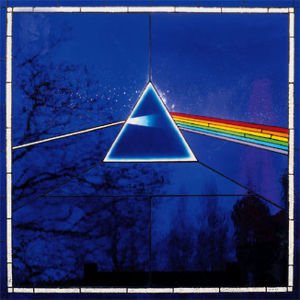
the Dark Side Of The Moon prism on the 30th anniversary SACD release - picture from Wikipedia
In 1975 Wish You Were Here, Pink Floyd’s tribute to their former band member Syd Barrett, was released. Like its predecessor, Wish You Were Here were an international commercial hit and close to a million orders had already been placed upon release. Shine On You Crazy Diamond, the incredibly beautiful and haunting tribute track to Syd Barrett, that acts as the album opener and closer were played in its full length and later the other tribute track, the title track Wish You Were Here were played as well. Waters’ songwriting deals beautifully with the loss they all felt after Barrett succumbed to mental illness, but he also further explores the hollowness of modern life and the music industry in the sinister Welcome to the Machine and the catchy Have a Cigar. This album is a prog rock masterpiece and many of their band member’s own admission represents Pink Floyd at its apex, when the band could still work together as a coherent whole. Richard Wright once stated in an interview that Wish You Were Here were one of the only Pink Floyd albums he could listen to for pleasure and David Gilmour has likewise stated that it is his favourite Pink Floyd album. My father’s friend also talked about the Wish You Were Here cover art that features a man on fire shaking hands with a normal man(see below). This was way before CGI, so the man on the picture were actually briefly set on fire while the picture were being taken. To this day, the cover and sleeve art of Wish You Were Here remain some of my favourite album art of all time.
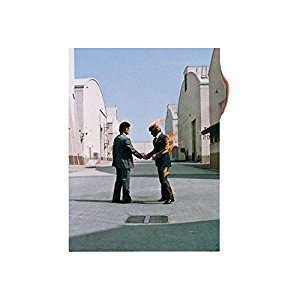.png)
Wish You Were Here album art - picture from Wikipedia
Two years after Wish You Were Here, Pink Floyd released the album Animals, that in sound and tone marked a sharp departure of the ethereal, lofty sound of Wish You Were Here towards a more stripped down hard rock sound. Besides a short album opener and closer, the tracks on Animals are all in the excess of ten minutes with Dogs, which takes up all of side one being close to 20 minutes in length. The album borrows its theme from George Orwell’s fable Animal Farm, which is a scathing critique of a communist society, but Waters takes the animal metaphors and turns them towards the capitalist society and contemporary British politics instead, making it the first overtly political Pink Floyd album. My father and his friend played no music from Animals, which I think is a shame, as its three tracks are brilliant examples of what Pink Floyd can do with a harder rock edge. The album begins with the tempo changing and slightly meandering Dogs, a metaphor of a ruthless businessman, who will do anything to reach to the top of the corporate hierarchy but achieves nothing in the end.
The next track Pigs(three different ones) takes a stab at the politicians of late 70’s Great Britain. While the ‘pigs’ in the two first verses are unnamed and could be considered stereotypes, Waters names the Conservative morality campaigner Mary Whitehouse. The song has an unusually hard and stripped-down sound and closes with one of Gilmour’s most brutal solos. Sheep is a high-tempo yet brooding rock tune about sheep, the herd-like masses, who just do what they are told. Throughout the song, the sheep rise up and kill the dogs, the proverbial enforcers on Orwell’s farm, but then again succumbs to the subjugation to their former masters, because they do not know how to wield the power that was given to them. One thing that was discussed was the cover art of Animals that features the iconic Battersea Power Station and a giant inflatable pig. Just before the picture was taken, the inflatable pig broke loose from its moorings and ended up shutting down air traffic in Heathrow Airport for a short while only to touchdown on a field southeast of London, where the owner of the field were furious that the inflatable pig had spooked his cows. The pig was brought back and several pictures were taken of the pig over the power station the following days, but since the pictures of the power station from the first day were considered better, the final cover art were a picture of the power station with a picture of the pig superimposed on it. I loved this cover art from the first time I saw it and the Animals poster I purchased as a teenager still hangs on my wall.
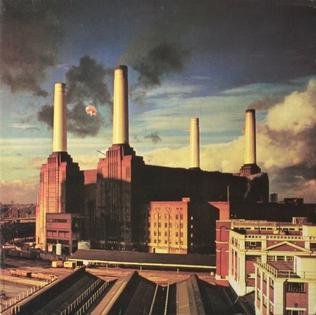
Animals album art - picture from Wikipedia
Following Animals, the rock opera sensation The Wall was released in 1979. It is hard to understate the cultural impact of this album and the movie it accompanied. From its striking visuals combining building a wall on stage during the live show along with the unique and disturbing cartoons made by Brisitsh cartoonist Gerald Scarfe to the inescapable (at least in my high school) refrain of ”We don’t need no education...” from Another Brick in the Wall part 2, The Wall is to this day a musical monument to youthful alienation and abandonment, anti-war sentiments and anti-authoritarianism. Already from the first track, In the Flesh? You know you are in for a ride as this double album through the medium of great classic rock tells the story of the rock star Pink, whose abandonment issues, rock and roll lifestyle and dysfunctional marriage(the proverbial ‘bricks in the wall’) lead him to become increasingly isolated from the world around him and reaches its apex with his delusions turning him into a fascist dictator demanding ultimate allegiance from his audience and ends in the cinematic and spine-chilling orchestral score The Trial, where Pink puts himself on trial, where each of the ‘bricks’ testify against him and the judge reaches the verdict that he should tear down the wall, thus exposing himself as being both responsible for his isolation and capable of reconnecting with the world around him, at which point in the stage show the physical wall that was built up throughout the show would be blown open, exposing the band again. I always found the last lines of The Trial incredibly evocative:
(…) and since, my friend, you have revealed your deepest fear
I sentence you to be exposed before your peers
Tear down the wall!
The Wall is a tour de force of Waters’ song writing abilities, but its creation was a painful one for the band: Relations between Roger Waters and keyboardist Richard Wright broke down completely during recordings to the extent where Wright were expelled from the and and only appeared during the live shows on the following tour as a paid musician rather than a member of the band. For me the highlights of the albums are definitely the melancholic and beautiful guitar instrumental Is There Anybody Out There?, Run Like Hell, which is arguably the best thing David Gilmour has ever written, and Comfortably Numb, which has the greatest Gilmour solo of all time. Yet, hearing my father speak so warmly about this album, I can tell that I do not connect with album on the same level as they do. Even considering the arguably amazing tracks on this album, I still prefer the style and feel of Animals when it comes to the era of Waters-led Pink Floyd, and as for Comfortably Numb I prefer the version on Delicate Sound of Thunder (which is entirely without Waters) for its more heavy and haunting feel. It could be the beginning self indulgence of Waters’ songwriting that is shining through in some parts or it could just be the teenage snob in me that considered The Wall too mainstream, but listening to this album today is a bittersweet experience, as you can tell that it is the end of an era, the end of Pink Floyd with its long-time line-up of Waters, Gilmour, Wright and Mason.
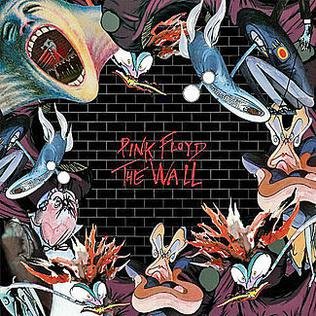
The Wall album art from the Immersion box set - picture from Wikipedia
The last Pink Floyd album of the Waters led-era is 1983’s The Final Cut. In many ways a continuation and expansion of the anti-war themes of The Wall with a background in the 1982 Falklands war and his own issues with the loss of his father during WWII. The words: ”(…) by Roger Waters. Performed by Pink Floyd” in the sleeve cover tells you that this is in its essence a Roger Waters solo project and it really feels like it. At this point, the political themes that Waters have continued to explore in his songwriting since Dark Side of the Moon now take up the whole album, and while there are decent songs such as Not now John and the overly dramatic but still sincere The Gunners Dream on there, Waters’ politics and childhood abandonment issues are a bit on the nose. My father and his friend played The Gunners Dream from The Final Cut but my fathe only spoke about the album and I understand why. Historically, this is a significant album as it marks the last album of the Waters-era, but musically it is but a footnote in the Pink Floyd discography.
Some years later in 1987, the Pink Floyd emerged with David Gilmour by the helm with the album Momentary Lapse of Reason. This was the second time that Pink Floyd parted ways with their principal songwriter and David Gilmour’s songwriting had a lot to prove in order to reach the greatness that Pink Floyd achieved during the Waters era. Rather than being a return to form, however, the only thing that Momentary Lapse of Reason really proved was that David Gilmour might be an amazing guitarist and important part of the Pink Floyd sound, but was not on par with Waters when it came to songwriting. And apart from the much lesser known Pink Floyd album More, this is the Pink Floyd album I have listened to the fewest times. My father played the first single from the album, Learning To Fly, which, along with the album closer Sorrow are the only things apart from the cover art that I can still enjoy from the album. The rest I consider somewhat tedious and pretentious.
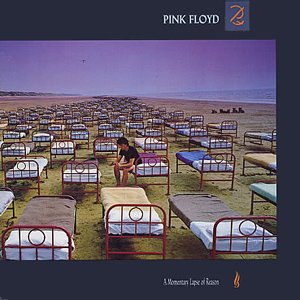
Momentary Lapse of Reason album art - picture from Wikipedia
In 1994, came the second album of the Gilmour era and final album from Pink Floyd The Division Bell(I am not counting The Endless River as it is essentially just discarded material from the Division Bell sessions). This album marked the return of Richard Wright as a full-fledged member of Pink Floyd and was themed around communication and how talking about problems can resolve them.
While The Division Bell is much more coherent and has more songs of a higher quality than the first album of the Gilmour era, I do not think that it comes close to the albums of the Waters era in terms of quality and notoriety. In fact, I cannot help but feel that this album was a (maybe subconscious) effort to capitalize on nostalgia for the Pink Floyd of the earlier eras: The talk box from Animals’ Pigs(three different ones) used on Keep Talking and the bells from Atom Heart Mother’s Fat Old Sun used on High Hopes certainly give off that impression. From this album, I quite enjoy the opener Cluster One, which features some great Gilmour guitarcraft and the sound of the Earth’s crust moving, which I also thought of as a great primal sort of sound effect, the catchy Lost For Words and finally High Hopes, which I think is the greatest tune from that era of Pink Floyd and serves as a great closing statement as the final song on the final album (again, not counting The Endless River). An interesting thing I noted when music from the last two albums were playing was that the room was much more a-buzz with conversation and much less attention were being paid to the music. This could just be the event reaching its third hour and the guests of the event including myself being 4-5 beers deep, but I also think it says something about to what extent the Pink Floyd of the earlier eras were able to capture the attention of the audience to a much greater degree than the Pink Floyd that Gilmour headed.
We all staggered home, tired, drunk and happy from the experience – good music really do bring people together.
I am truly looking forward to the next event!
Wow, an amazing post on Pink Floyd's music, @cogitecture ! I sure had a great fun reading this since I am actually one of those unfortunate souls who had missed out entirely on the Pink Floyd's era...
Really neat article, well written and wonderful to read <3
PF Era is live even now. :)
We still have active Gilmour and Waters. :)
:O really!!! i am super blind to the music scene but i'm trying to expand my ears !!
i grew up in asia and i have very bad taste in music (im a fan of kpop stuff)
will have to level up my music tastes !!!
@veryspider I too grew up in Asia and fan of Kpop (can't get enough Mamamoo lately), but I'd say, Pink Floyd is really a great start for a whole new level of musical taste :D
I'm one of those .... BTS and EXO fangirl HAHAHAHAHA
yesh, I will definitely expand my musical taste !!! Pink Floyd will be a new horizon for my ears ! :D
@gibic <3
Take your time @veryspider :)
@veryspider, if you want to give Pink Floyd a listen, I will recommend to start with Dark Side Of The Moon or Wish You Were Here, as they are the most accessible while still being very Pink Floyd-like.
I really like the earlier stuff, but it takes a little getting in to :D
Thanks a lot, @veryspider!
I, too, was born too late to have experienced Pink Floyd on their peak. I did see Roger Waters perform The Wall live some years ago though I don't think the feel of that can entirely compare to the real thing :)
Hi cogitecture,
Visit curiesteem.com or join the Curie Discord community to learn more.
With this post I learned a everything I didn't know about Pink Floyd. I don't really listen their music, but I take the time to read you. It was rewarding ... well done
Thanks a lot, @wisejg! :)
This post was shared in the Curation Collective Discord community for curators, and upvoted and resteemed by the @c-squared community account after manual review.
@c-squared runs a community witness. Please consider using one of your witness votes on us here
I am only a casual fan of music so reading your thoughts about Pink Floyd in such great details is amazing.
Congrats for your curie vote ^_^.
Thank you so much, @scrawly! :)
If I can convey just an iota of how I feel about this music through my writing and maybe even give someone the desire to explore more on their own, my work here is done ^_^
Congratulations @cogitecture! You have completed the following achievement on the Steem blockchain and have been rewarded with new badge(s) :
Click here to view your Board of Honor
If you no longer want to receive notifications, reply to this comment with the word
STOPTo support your work, I also upvoted your post!
Congratulations @cogitecture! You have completed the following achievement on the Steem blockchain and have been rewarded with new badge(s) :
Click here to view your Board of Honor
If you no longer want to receive notifications, reply to this comment with the word
STOPThank you everyone on for this overwhelmingly positive response! It makes me happy to see that people enjoy my writing :)